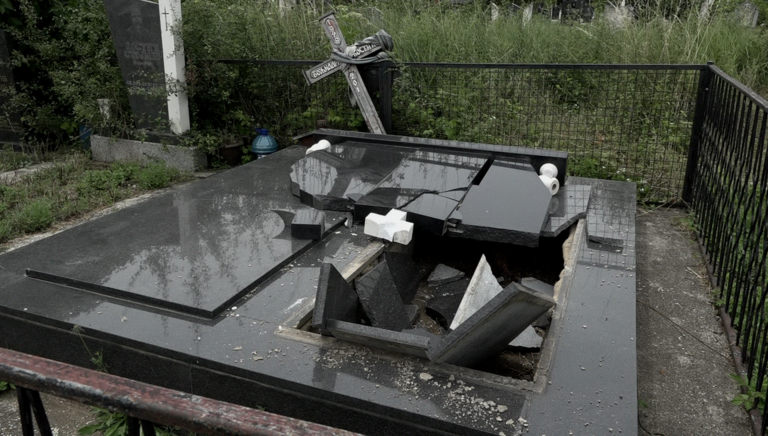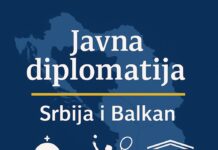„In terms of interfaith tolerance and coexistence, Kosovo sets an example in the region and beyond,“ the Kosovo Foreign Minister, Behgjet Pacolli said at a ministerial conference on religious freedom held in Washington. While Pacolli claims that the various religious communities in Kosovo „live together in harmony,“ the Kosovo Police still fail to find those responsible for the latest desecration of tombstones at the Lipljan Orthodox cemetery.
What did Pacolli say about religious freedom in Kosovo?
A ministerial to advance religious freedoms was held in Washington. Numerous world leaders, including Pacolli, attended the conference. The Kosovo Foreign Minister underlined that he was given an opportunity to present „a multiethnic and multi-religious Kosovo mosaic.“
He claimed that „religious freedom is a principle important to Kosovo for the sake of history, heritage and the future.“
US Ambassador to Pristina, Philip Kosnett also reacted on the occasion of this ministerial on religious freedoms, which was attended by nearly 1,000 leaders, including representatives from Kosovo.
“How does Kosovo respond to shameful desecration of Lipjan/Lipljan graves? Safe religious expression requires inter-community respect and swift justice,” Kosnett tweeted.
https://twitter.com/USAmbKosovo/status/1151112012912574471?s=20
„On our way forward, we have to look at our long tradition of peaceful coexistence among different religions; we, Muslims, Catholics, Orthodox Christians, Protestants, Jews and many other communities live together in harmony,“ Pacolli emphasized, adding:
„The Kosovo Constitution promotes the unlimited expression of religion and provides equal treatment to all religions and believers in Kosovo.“
He said that Kosovo is establishing institutional mechanisms that would strengthen the government’s involvement in all religious communities in Kosovo.
„Kosovo is an example in the region and beyond in terms of interfaith tolerance and coexistence,“ claimed Pacolli.
What does the State Department’s Report on Religious Freedom in Kosovo say?
The violation of property rights of the Serbian Orthodox Church, the employment discrimination against devout Muslims, and the acquittals of imams charged with inciting religious and ethnic hatred are just some of the issues revealed in the State Department’s Report on Freedom of Religion in Kosovo in 2018.
This report describes the position of the Serbian Orthodox Church in Kosovo through concrete examples of violations of the law, as well as interference in performing religious ceremonies.
The report also mentions refusal to comply with the decision of the Kosovo Constitutional Court to confirm the Decani Monastery’s ownership over 24 hectares of land in the same municipality. It further reads that the Kosovo government did hold the Mayor of Decani, Bashkim Ramosaj to account for failing to implement this decision.
“Decani Municipality moved forward with plans to construct a road through the SPZ near Visoki Decani Monastery. According to EU and OSCE legal opinions issued during the year, Kosovo law forbids the construction of a transit road through an SPZ. The Prime Minister’s Office disputed this legal interpretation,” the report adds.
Pristina-based Gazeta Express wrote about the St. Nicholas church in Prizren in May. The portal reported that the municipality of Prizren refuses to grant permission for the reconstruction of the destroyed church because, as they claimed, according to UNESCO rules, „the ruins are not to be reconstructed because there is a risk of faking history, as has happened with churches in Kosovo.“
The government still refuses to issue a construction permit to the Serbian Orthodox Church for the reconstruction of the St. Nicholas church in the Holy Archangels Monastery in Prizren. In its denial of the permit, the Ministry of Culture stated the SOC was not listed as the land’s legal owner in government records. St. Nicholas Church in Prizren was damaged during the March 2004 pogrom.
The State Department states that a multiethnic police unit for specialized protection of cultural and religious heritage sites provides 24-hour protection to the special protected zones, while religious sites outside these areas, which do not have police protection, often become targets of robbery and vandalism.
The report also records several concrete security incidents, including an incident when Kosovo Albanians threw rocks at Orthodox believers in the village of Petric in the Pec region on May 28; an attack on a Serbian Orthodox priest and his family in Istok on May 30 of last year; a stone-throwing attack on Orthodox pilgrims in Istok on October 21; a protest by a group of Albanians in Pec on January 6, which was held despite the fact that the Serbs from Djakovica canceled a visit to the local church, during which four elderly nuns were captured in a monastery where the Holy Liturgy was not served due to the blockade.
The suspects were detained in the majority of these cases but not a single charge was filed due to lack of evidence – the State Department report reads.
Novo Brdo: Eparchy of Raska-Prizren concerned about the announcement of construction in a protected religious site; the Orthodox Church presented as a Catholic object.
The Kosovo media announced in early June the construction of the „cathedral in Artana, formerly Novo Brdo,“ carried out by the Archaeological Institute of Kosovo with the financial support of the German Embassy in Pristina. On that occasion, the media presented the same site as a Roman Catholic church. The Eparchy of Raska-Prizren reacted, expressing concern over the announcement of the beginning of construction at “the site of the old Serbian medieval cathedral church of St Nicholas, the cathedral church of the Novo Brdo and Gracanica bishops, in the immediate vicinity of the Novo Brdo fortress.” According to the Eparchy, it is one of 40 special protected zones – which are subject to a special procedure under Kosovo law. „This special procedure of determining if work can be carried out on a site depends not only on the decisions of Kosovo institutions but also the position of the Serbian Orthodox Church,“ the Eparchy stressed.
In addition, this old religious site is wrongly presented on the website of the Kosovo Ministry of Culture as a Roman Catholic church, without any mention of the authentic history of the temple and the results of archaeological research so far – the Eparchy underlined.
https://kossev.info/last-week-a-desecrated-cemetery-this-week-kosovo-is-an-example-of-interfaith-tolerance-and-coexistence/













